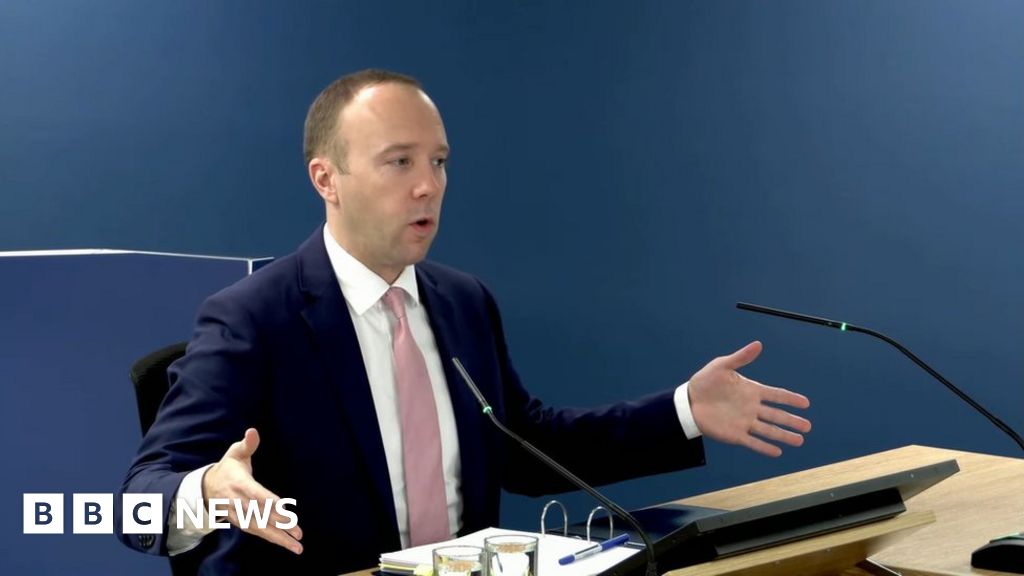
Matt Hancock said school closures in January 2021 could have been avoided if ministers had taken action earlier last autumn.
The former health secretary told the Covid inquiry that avoiding a lockdown led to tougher measures being taken later.
WhatsApp messages from October 2020 showed he was concerned that then-Chancellor Rishi Sunak was putting “pressure” on Boris Johnson “not to do enough again”.
He also accused local leaders of putting “politics above public health.”
The West Suffolk MP noted that politicians in Greater Manchester such as the mayor, Andy Burnham, had been “effectively unhelpful” when the government tried to put in place local restrictions.
This was the second day of the inquiry in which the inquiry heard evidence from Mr Hancock, who was health secretary for much of the pandemic.
He was forced to resign in June 2021 after he was caught violating social distancing rules by kissing his assistant, Gina Coladangelo.
When asked about the incident, he acknowledged that it could have damaged public confidence in the rules.
More about Covid and Covid Inquiry
Questions at the beginning of Friday’s session focused on decisions taken starting in September 2020, when Covid cases began to rise after a lull in the summer.
WhatsApp messages from October 2020 show Mr Hancock asking civil service chief Simon Case for information about a meeting he claims had been “blocked”.
“Rishi is in the room…so the PM will be under enormous pressure not to do enough again,” he wrote.
Mr Case replied: “Rishi has already resigned himself to the choice he has… His only question (and a fair question) is about non-essential retail – where we clearly have no evidence of transmission.
“He thinks it’s better to do something in high schools (where we know transmission is happening) than to close all the stores (where we know it doesn’t seem to be happening).”
Speaking to the inquest’s barrister, Hugo Keith KC, Mr Hancock rejected suggestions that there was a trade-off between health and economic considerations, saying: “If we don’t lock down there will be more deaths and we will have to face tougher measures.” Closing in the future.”
He added: “So, with hindsight, if we had taken urgent action in September 2020, we could have avoided for example the need to close schools, which we ultimately had to do because cases were so high by January.”
By January, the situation had become so dangerous that “every lever had to be pulled,” Hancock added.
There has been concern about the harmful impact of school closures on children – especially those from disadvantaged backgrounds.
Earlier this year, MPs warned that it could take 10 years to narrow the gap between disadvantaged children and other children to where it was before the pandemic.
In mid-October 2020, in an attempt to slow the spread of the virus, the government introduced a tier system, where different rules were implemented in regions depending on local case numbers.
In his testimony to the inquiry, Hancock said he was “in a state of despair” when the policy was announced because he knew it “wouldn’t work”.
This was because tougher restrictions were not strong enough, he said, but also because negotiations with local leaders led to delays and confusion.
He praised Joe Anderson, who was Mayor of Liverpool at the time, saying they had been able to work together to put together an “effective” support package.
However, he raised eyebrows when he said Mr Anderson was “sadly, no longer with us”, even though the former mayor is still alive.
Anderson responded by posting a message on social media: “I just took my pulse and it looks like I’m still here and feeling fine.”
Andy Burnham gave evidence to the inquiry earlier in the week
Comparing Mr Anderson to other local leaders, Mr Hancock said they were “not very constructive and in some cases not effectively helpful”.
Mr Keith KC asked whether this was what former Chief Scientific Advisor Sir Patrick Vallance was referring to when he mentioned in his memoirs the “difficult negotiations in Manchester”.
Hancock said this was the case and stressed that his comments were about local leadership, adding: “I have no quarrel with the wonderful city of Manchester.”
Greater Manchester was placed in tier three restrictions on October 20, meaning pubs and bars are closed and household mixing is restricted.
The decision sparked a dispute between Burnham and the government over the amount of financial support that should be provided to the region.
Responding to the criticism, Burnham said: “This may be Mr Hancock’s opinion, but he is wrong.
“The mayor and ten leaders in Greater Manchester, including the Conservative leader, have spent long hours trying to negotiate a deal with the government… Support them.”
“Therapy sessions”
The inquiry was shown letters in which Hancock said he wanted to make a particular announcement as soon as possible, saying: “It will leak out anyway – and the Scots will try to make their announcement first.”
He told the investigation: “Sometimes, [she] “He will leave the meeting and start communicating the decision, for example, sooner than agreed.”
He said he had a good relationship with the health ministers of Wales, Scotland and Northern Ireland, and likened their meetings to “therapy sessions”.
Ms Sturgeon appeared at the inquiry in June this year, but is expected to appear again, with public hearings continuing until 2026.
Boris Johnson and Rishi Sunak are expected to give evidence to the inquiry before the end of the year.

“Travel specialist. Typical social media scholar. Friend of animals everywhere. Freelance zombie ninja. Twitter buff.”





More Stories
Taiwan is preparing to face strong Typhoon Kung-ri
Israel orders residents of Baalbek, eastern Lebanon, to evacuate
Zelensky: North Korean forces are pushing the war with Russia “beyond the borders”